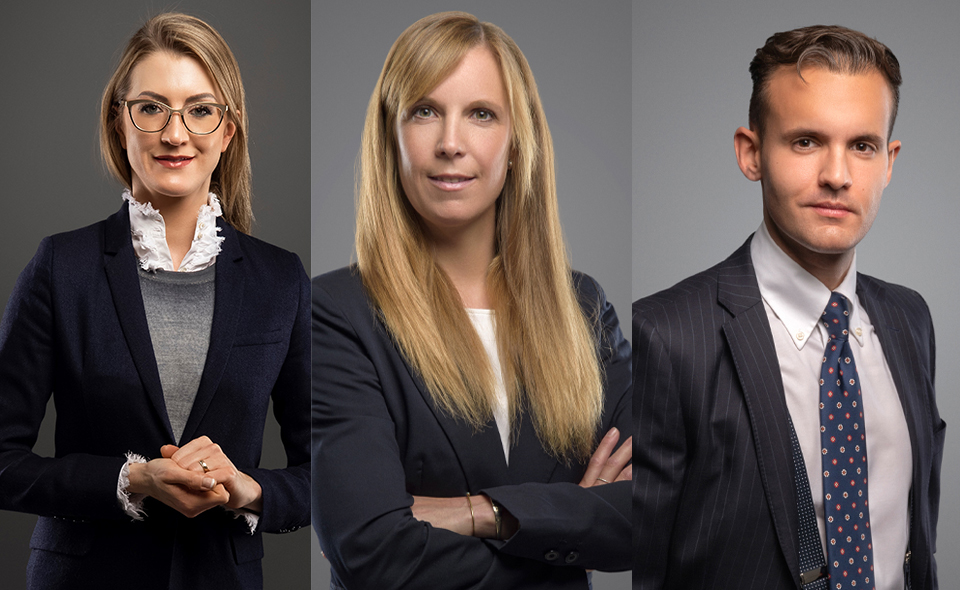 We discover more in this interview with partner Béatrice Stahel and associates Arthur Seppey and Catherine Lagger-Fournier at MC AVOCATS SA, a leading Swiss business law firm that specialises in the relocation of individuals and entrepreneurs.
We discover more in this interview with partner Béatrice Stahel and associates Arthur Seppey and Catherine Lagger-Fournier at MC AVOCATS SA, a leading Swiss business law firm that specialises in the relocation of individuals and entrepreneurs.
What is it that makes Switzerland an attractive country for entrepreneurs?
Switzerland has a stable political and economic environment which allows for greater predictability, which is much appreciated by entrepreneurs. Its natural beauty and safe environment are all highly appreciated, and the Swiss financial marketplace is very strong and influential. Swiss policy is based on the economic development of entrepreneurs, both medium-sized and multinational companies.
In addition, Switzerland is the home of many important NGOs and headquarters of various types of companies, with outward-looking government policy and a welcoming attitude towards foreign entrepreneurs. Its world-renowned health system and education system, including private, public and international schools, continue to be highly valued by individuals and families. In addition to this, the Swiss tax system is recognised as being advantageous to entrepreneurs.
This being said, our law firm’s experience tends to confirm that over the last few years the trend has changed, as a result of which people are looking less at the tax advantages and more towards the many other benefits of living in Switzerland.
Has there been a noticeable change in the number of prospective business-makers seeking entry to the country? Why do you think this might be?
Since the Agreement on the Free Movement of Persons between the European Union and Switzerland (AFMP)’s entry into force on 1 June 2002, the gap between Swiss citizens and foreigners with a self-employed activity in Switzerland has slightly decreased (in 2002 there was a difference of 7.8 points; in 2017 this had become a difference of 6.5 points). According to the last official statistics, 7.9% of the Swiss working population are self-employed foreigners.
We wish to point out that foreigners who have been naturalised are counted as Swiss citizens in these statistics.
Furthermore, Switzerland encourages innovation, ranking second to the US in the Global Entrepreneurship and Development Index (GEDI).
Can you give us an impression of the Swiss government's attitude towards foreign immigrants looking to establish businesses?
This question cannot be answered simply, as Swiss law is different depending on the country of origin of the foreigner. Furthermore, the conditions are different according to the type of foreign permit that the entrepreneur wants to obtain from the Swiss state.
Even if the rules governing the foreigners are mainly federal, cantonal authorities have a major input in the decision-making process. Variations exist, depending on the cantonal interpretation and application of the federal law. Our law firm is particularly familiar with these practical aspects, as that legal field is at the heart of our business.
Switzerland encourages innovation, ranking second to the US in the Global Entrepreneurship and Development Index (GEDI).
In brief, what are the key regulations and statutes that govern this practice?
The key regulations and statutes which govern this practice are the Federal Act on Foreign Nationals and Integration (FNIA), the above-mentioned AFMP, various Free Trade Agreements concluded by Switzerland and the cantonal laws applying the aforementioned FNIA.
What permits or other qualifying factors must be obtained before a foreign entrepreneur can set up a business in Switzerland?
From a Swiss corporate law perspective, a foreign company wishing to establish itself in Switzerland to develop a business must register a branch or a subsidiary with its headquarters in Switzerland in the Commercial Register. This branch or subsidiary must be represented by at least one person residing in Switzerland.
During the registration process, the compliance of the company's articles of association with Swiss law will be verified, in particular the fact that it has a share capital in accordance with Swiss law (CHF 20,000 for a private limited company and CHF 100,000 for a limited company).
From a Swiss labour law perspective, the company must apply for and obtain work permits that are eligible for entrance into Switzerland before employees may work for a company.
From a Swiss foreigners’ law perspective, there are many differences between European nationals and non-European nationals. For non-European nationals, it is almost impossible to obtain a residency permit for people who are not self-employed. As a result, for non-European nationals, setting up a business is often an interesting option to explore for obtaining a residency permit in Switzerland. To obtain this permit, the applicant has to prove in particular that his business is viable, including producing a business plan.
What steps are involved in this process? How does it differ for high-net-worth investors or EU nationals?
The first consideration would be a person’s eligibility for entry to Switzerland. EU nationals are allowed to enter to Switzerland freely (AFMP). Most non-European nationals need a Schengen visa to enter Switzerland.
The second step is a work permit. For this matter, non-European nationals have to demonstrate very specific capacities, which often makes it difficult – if not impossible – for them to obtain a residency permit as employees.
There are a number of incentives encouraging wealthy individuals to reside in Switzerland – for instance, the so-called lump-sum taxation.
For non-European nationals, it is almost impossible to obtain a residency permit for people who are not self-employed.
The expertise of an experienced law firm, providing bespoke advice and having an international know-how is paramount in assisting persons seeking a B permit. A residency permit based on a self-employed activity (setting up a business) can be particularly interesting option for non-European citizens under the age of 55 years, who are not eligible to apply for residency as retirees unless they enrol for an expensive lump sum regime based on ‘major public interest’.
What difficulties are entrepreneur immigrants most likely to encounter in this process?
Entrepreneur immigrants may encounter legal and administrative issues in this process. As said above, the difficulties may arise according to the type of foreign permit that the entrepreneur wants to obtain, as well as his country of origin and the cantonal State in which he is applying for a permit.
It is therefore essential for foreign entrepreneurs setting up a business in Switzerland to seek tailor-made advice from a law firm having extensive experience in these matters, taking into consideration all relevant parameters.
What can a properly qualified lawyer do to ease this process and circumvent such problems before they arise?
Choosing a law firm which has extensive, transversal and, above all, practical experience with applying for residency based on setting up a business in Switzerland. Such a permit necessitates the coordination of a very wide range or parameters, being pragmatic and understanding the spirit of entrepreneurship. It also includes various legal issues such as the regulations from the point of view of both company law and labour law.
It is essential to choose a law firm which has the global know-how to establish a business plan, engage in estate planning and tax simulation (examination of the best options from a tax point of view) and give valuable real estate advice, as well as holding experience in family office matters – in a nutshell, a law firm that delivers all-round pragmatic and tailor-made services.
The selected law firm must also have a close and regular contact with the various competent authorities, thus facilitating the process for a foreign company wishing to start its activity in Switzerland. The choice of the seat, subsidiary, or branch may all be important, as might the legal form of the company.
[ymal]
Is there anything else that prospective business-makers ought to know about settling in Switzerland?
Yes. Between the French, the Italian and the German speaking parts of Switzerland there are many cultural differences. Both French and Italian parts are considered the Latin part of Switzerland.
Switzerland’s differences are its strength. In a nutshell, Switzerland is a mix of innovation and tradition, both of which are highly valued.
The local mentalities vary a lot from one part to another, which can be an important aspect for an entrepreneur to consider when choosing exactly where in Switzerland to set up a business, ideally choosing the best place according to his business plan and commercial strategy.
Béatrice Stahel, Founder and Partner
Arthur Seppey, Associate
Catherine Lagger-Fournier, Associate
MC AVOCATS SA
Sion, Geneva, Gstaad, Switzerland
Tel: +41 27 324 80 90
E: beatrice.stahel@mc-avocats.com | arthur.seppey@mc-avocats.com | catherine.lagger-fournier@mc-avocats.com
Béatrice Stahel is the founder of MC AVOCATS SA. With 15 years of experience at the Bar, she has developed her expertise in domestic and international contract law, international private law, commercial and company law and specific enforcement law, and has acted as leading counsel in multiple judicial and arbitral proceedings with international ramifications.
Binational (Swiss and British)
Catherine Lagger-Fournier joined MC AVOCATS SA as an associate in November 2016. Her experience includes more than eight years of membership at the Valais Bar, which has allowed her to develop sound skills in contract law, commercial law, matrimonial and inheritance law, and in assisting people from abroad in taking up residency in Switzerland.
Binational (Swiss and Belgian)
Arthur Seppey joined MC AVOCATS SA as an associate in September 2021. Prior to this he spent two years as a trainee attorney at the RITZ law firm, during which he became familiar with many legal fields, including civil law, criminal law and public law and the related legal proceedings.
Binational (Swiss and Italian)
MC AVOCATS SA is a perfectly multilingual boutique law firm active in business law. The firm is active throughout Switzerland, with services particularly well-tailored to an international, cosmopolitan and demanding clientele seeking highly individualised advice. One of its specialties is in relocating individuals and entrepreneurs in Switzerland.




 We discover more in this interview with partner Béatrice Stahel and associates Arthur Seppey and Catherine Lagger-Fournier at MC AVOCATS SA, a leading Swiss business law firm that specialises in the relocation of individuals and entrepreneurs.
We discover more in this interview with partner Béatrice Stahel and associates Arthur Seppey and Catherine Lagger-Fournier at MC AVOCATS SA, a leading Swiss business law firm that specialises in the relocation of individuals and entrepreneurs.
















